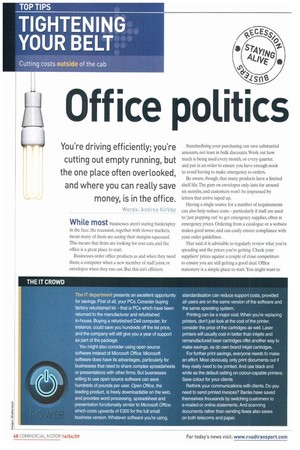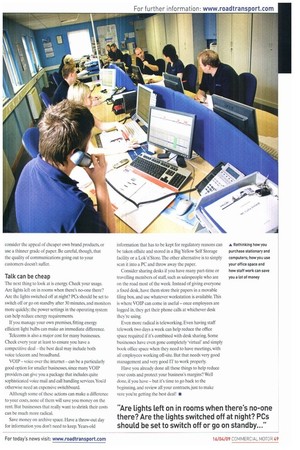Office politics
Page 48

Page 49

If you've noticed an error in this article please click here to report it so we can fix it.
You're driving efficiently; you're cutting out empty running, but the one place often overlooked, and where you can really save money, is in the office.
Words: Andrea Kirkby
White most businesses aren't staring bankruptcy in the face, the recession, together with slower markets, mean many of them are seeing their margins squeezed. This means that firms are looking for cost cuts, and the office is a great place to start.
Businesses order office products as and when they need them; a computer when a new member of staff joins, or envelopes when they run out. But this isn't efficient. Standardising your purchasing can save substantial amounts, not least in bulk discounts. Work out how much is being used every month, or every quarter, and put in an order to ensure you have enough stock to avoid having to make emergency re-orders.
Be aware, though, that many products have a limited shelf life. The gum on envelopes only lasts for around six months, and customers won't be impressed by letters that arrive taped up.
Having a single source for a number of requirements can also help reduce costs — particularly if staff are used to 'just popping out' to get emergency supplies, often at emergency prices. Ordering from a catalogue or a website makes good sense, and can easily ensure compliance with your order guidelines.
That said, it is advisable to regularly review what you're spending and the prices you're getting. Check your suppliers' prices against a couple of close competitors to ensure you are still getting a good deal. Office stationery is a simple place to start. You might want to consider the appeal of cheaper own brand products. or use a thinner grade of paper. Be careful, though, that the quality of communications going out to your customers doesn't suffer.
Tail( can be cheap The next thing to look at is energy. Check your usage. Are lights left on in rooms when there's no-one there? Are the lights switched off at night? PCs should be set to switch off or go on standby after 30 minutes, and monitors more quickly: the power settings in the operating system can help reduce energy requirements.
If you manage your own premises, fitting energy efficient light bulbs can make an immediate difference.
Telecoms is also a major cost for many businesses. Check every year at least to ensure you have a competitive deal — the best deal may include both voice telecom and broadband.
VOW— voice over the intemet — can be a particularly good option for smaller businesses, since many VOW providers can give you a package that includes quite sophisticated voice mail and call handling services. You'd otherwise need an expensive switchboard.
Although some of these actions can make a difference to your costs, none of them will save you money on the rent. But businesses that really want to shrink their costs can be much more radical.
Save money on archive space. Have a throw-out day for information you don't need to keep. Years-old information that has to be kept for regulatory reasons can be taken offsite and stored in a Big Yellow Self Storage facility or a Lok'n'Store. The other alternative is to simply scan it into a PC and throw away the paper.
Consider sharing desks if you have many part-time or travelling members of staff, such as salespeople who are on the road most of the week. Instead of giving everyone a fixed desk. have them store their papers in a movable tiling box, and use whatever workstation is available.This is where VOIP can come in useful— once employees are Logged in, they get their phone calls at whichever desk they're using.
Even more radical is teleworking. Even having staff tetework two days a week can help reduce the office space required if it's combined with desk sharing. Some businesses have even gone completely 'virtual' and simply book office space when they need to have meetings, with all employees working off-site. But that needs very good management and very good IT to work properly.
Have you already done all these things to help reduce your costs and protect your business's margins? Well done, if you have — but it's time to go back to the beginning, and review all your contracts, just to make sure you're getting the best deal! •








































































































































